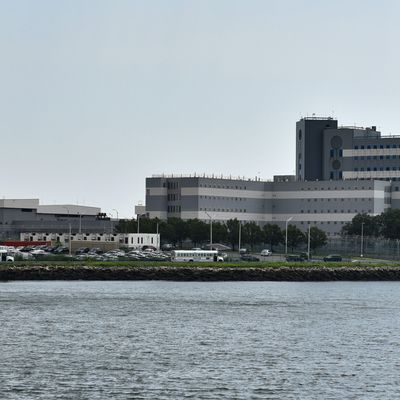
A prisoner at Rikers Island has tested positive for the novel coronavirus. The New York Daily News reported the development on Wednesday, mere hours after union officials confirmed that a corrections officer at the notorious New York jail complex had also tested positive. This marks the virus’s first known appearance among the city’s incarcerated population — a dreaded occurrence that the busy and bloated system is ill-equipped to handle. Earlier this week, a NYC Department of Correction investigator named David Perez died after testing positive for the SARS-CoV-2 virus. An employee at the Sing Sing Correctional facility in Ossining has coronavirus too, as does a prisoner at the Nassau County Correctional Center in East Meadow.
Legal and reform advocates have been bracing for the havoc that this very occurrence might wreak. America’s prisons and jails are uniquely vulnerable to the virus’s ravages, having been designed to prevent the very precautions that are known to stem its spread: social distancing, frequent handwashing and use of hand sanitizer, regular cleaning of oft-used surfaces. None of these are possible in remotely adequate volume inside facilities marked by large, captive populations with restricted access to soap and running water and where hand sanitizer is often deemed contraband. The absence of accessible medical care doesn’t help either. Moreover, the “churn” created by prisoners’ being shuffled in and out of jails is an ideal mechanism for transporting pathogens back and forth with them.
Advocates have responded with calls to reduce jail and prison population sizes in order to stem the potentially deadly costs of an outbreak. (New York City’s Board of Correction, an oversight committee, called for Rikers inmates to be released en masse earlier this week.) Public officials have vast discretion to do so: Police and sheriffs could perform fewer arrests, prosecutors could file fewer and less severe charges to keep people from entering jails in the first place, and state governors and President Trump could use their commutation and pardon powers to free the elderly, the immunocompromised, and prisoners who don’t pose a demonstrable public-safety threat.
De-carceration has long been a moral imperative. Now it’s an anti-pandemic one, too. And Rikers Island is a prime candidate. The complex is so historically rife with abuses and violations of its inmates’ constitutional rights that officials recently agreed to close it down. (They are currently on track to do so by 2026, replacing it with four smaller and more dispersed complexes throughout the city.)
But during the coronavirus crisis, New York’s primary innovation regarding inmates and public health has been to use cheap prison labor to address shortages of hand sanitizer. Under the label Corcraft Products and the pretense of job skills training, the state is using prisoners to manufacture the stuff for distribution at schools, the MTA, and other government agencies. The irony of incarcerated people making a potentially lifesaving product for the masses that they would just as soon be denied is not lost on observers. The stakes, however, are no less high. There’s still no sign that the U.S. government has even the loosest hold on how to control the spread of this virus. The Rikers case is poised to expose how much worse America’s collective zeal for imprisonment can make it.
We’re committed to keeping our readers informed.
We’ve removed our paywall from essential coronavirus news stories. Become a subscriber to support our journalists. Subscribe now.






























